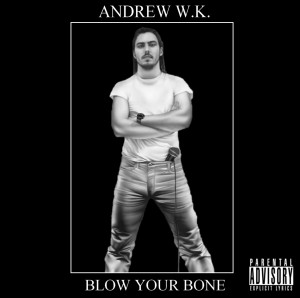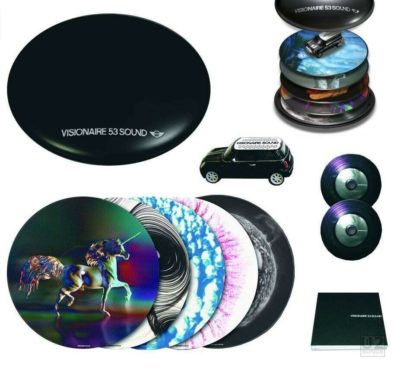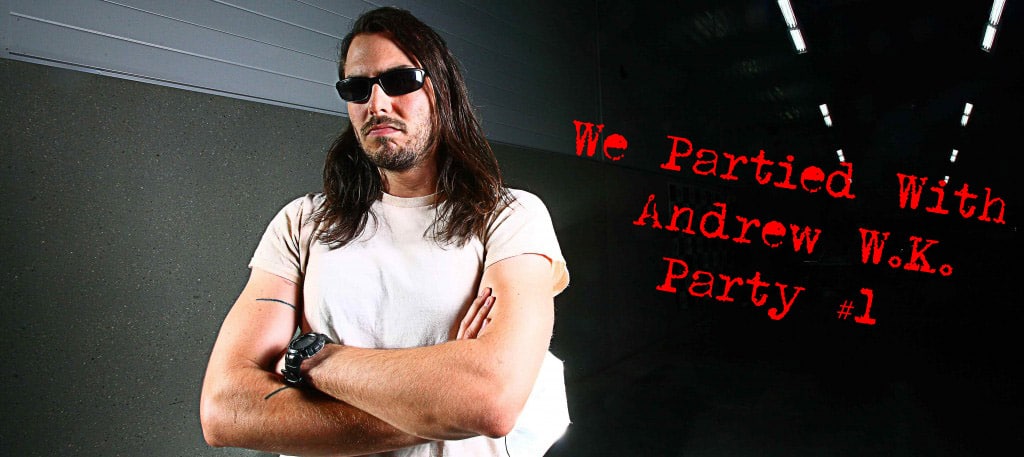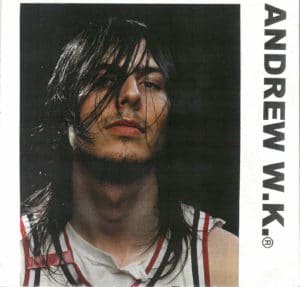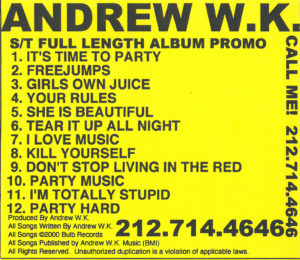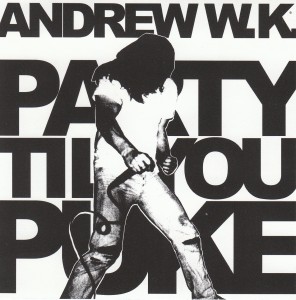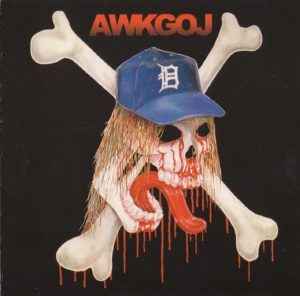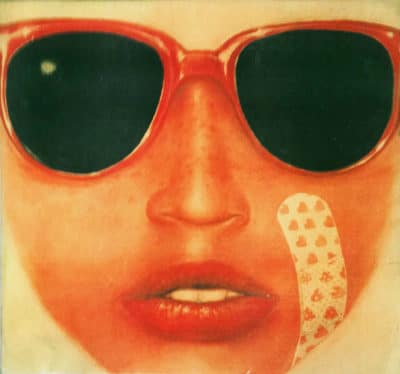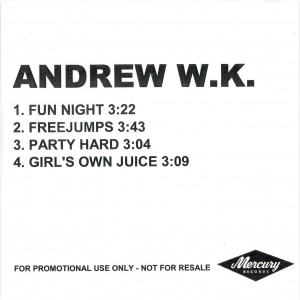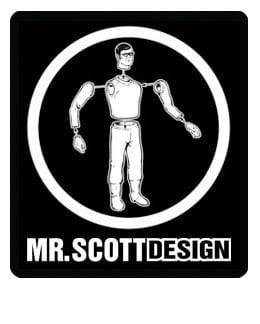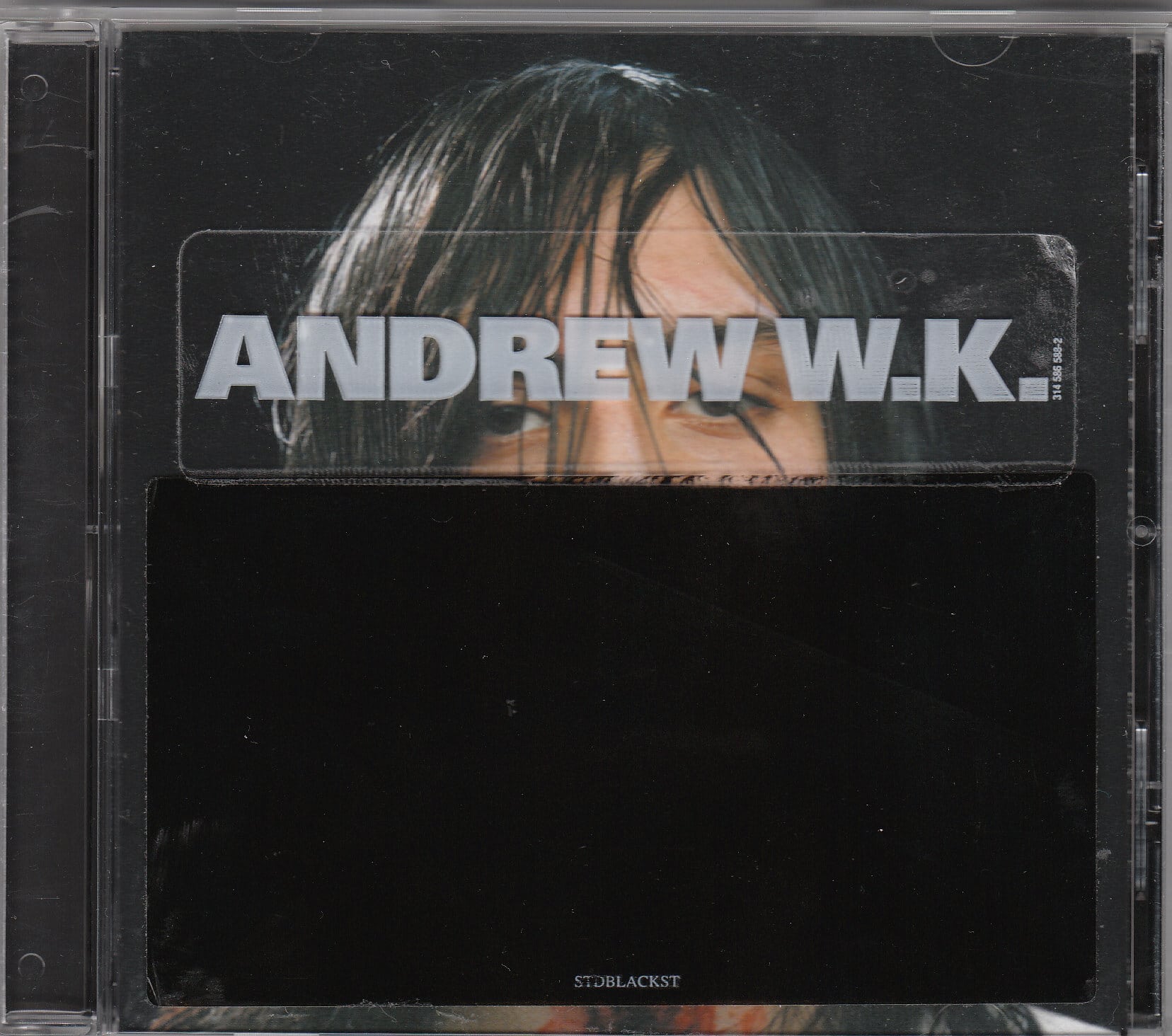We Partied With Andrew W.K. (3 of 4)
-Party #3-
September 6, 2011
Missed interviews 1 & 2? Check them out here: Party #1 & Party #2
Andrew W.K.: What would you like to talk about this time? I’m always curious.
AWKMusic: I would like to get into your past discography again… if that’s alright?
Andrew W.K.: Sure, the site is looking really amazing by the way, it always does. I just can’t thank you enough for how good it is.
AWKMusic: Thanks! I’ve never been able to confirm if there was a single released in Japan for “Long Live The Party”, do you know if there is any substance to that?
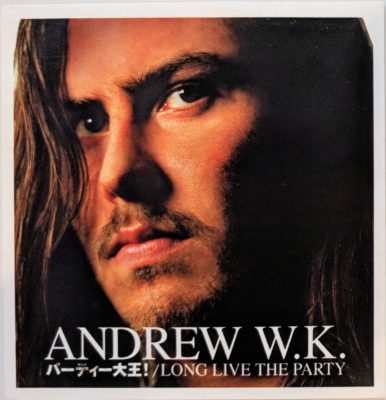
Andrew W.K.: I don’t know if it came out as a separate release. I mean digitally it may have, although digital at that point in 2003… hmm. I mean, there was a song I did called “Long Live The Zippy” is that what you’re talking about? It was a special version of Long Live The Party that I believe was shortened slightly from the album version where I said “I want to be a zippy, I want to be a zippy” and other lyrics were changed to pay tribute to the radio station “Zip FM”. It’s just a long standing and popular station that’s also been very supportive of us in Japan. I think they did release it on an annual compilation CD they put out every year. It has different artists with songs and with funny messages and different things. So that did happen, maybe that’s what people have been confused about. There is a video for it we filmed and I vaguely remember seeing it or seeing clips from it at some point.
AWKMusic: People have thought in addition to that there was a single, but it sounds like that’s not the case. I’m also aware that on The Wolf’s U.S. version of Long Live That Party is slightly shorter.
Andrew W.K.: Yea, on that song [LLTP] it’s the way it starts. On the Japanese version there’s a longer intro. For some reason we had that ability, I don’t remember why it was such a subtle change though. I actually liked it both ways, I guess I couldn’t decide whether I liked it slightly longer at the beginning or slightly shorter. Or someone was maybe giving me their advice or their opinion that shorter was better. So anyway, I did the U.S. version one way and was also satisfied that I could do the Japanese version and do the longer way. I think we did release it as a single but it never came out as a separate packaged release, does that make sense?
AWKMusic: Right, so it was just for the radio stations or something.
Andrew W.K.: Yea and we filmed a video for it where we used live footage. We just re-edited live footage that we also used from Furnace Fest [2003 concert] and we also used the “Your Rules” video from the US. It was just that in Japan they wanted to release a party song first instead of Never Let Down as the first single. So they choose that song and we sent it to them. But yea we never released it as a packaged release.
AWKMusic: OK great! That’s been out there for years so it’s great to know what happened.
Andrew W.K.: Yea unless it’s out there somewhere and someone can find it, but I’m not aware of it.
AWKMusic: Actually speaking about live stuff, there’s a guy named Dave “Big Shirt” Nichols.
Andrew W.K.: Yea! He was our sound-man from the very beginning, from when we first started up until… boy I’m not sure what was the last show he did with us. Maybe in 2004 or 2005. You know, our whole band and crew was largely assembled by Donald Tardy [1st drummer in A.W.K.] who had worked with Big Shirt in Obituary. Big Shirt went on to work with Slipknot and actually worked with them for several years and he’s just amazing. He was a lot of fun, he was an Englishman and actually our first tour we ever did was in England. So it was very helpful to have an Englishman and have a very big and strong guy. He’s huge, that’s why they call him “Big Shirt” [laughter]. That’s because there’s some kind of tradition in England, like here [U.S.] we might call someone “tiny” if there really big or whatever. So there, this nickname that you do if you’re big, I guess, you call the person a “big shirt”; and that becomes their nickname.
Big Shirt told a story about how during his years of being big and being called “Big Shirt”. One day on tour he met a guy who came up and said “Hey, I heard your name is Big Shirt?” and he was like “Yea, well it’s my nickname”. And then the guys said “Well I got an even bigger shirt and I’m called Big Shirt too and I think I’m the Big Shirt”. The guy was bigger than him, so then that guy became “Bigger Shirt” [laughter]. But yea he’s an amazing guy, I miss him a lot. He also tour managed us very briefly for a moment. He was with us for years and years on that first five year stretch. We were on the road constantly and he was there for more than majority of it.
AWKMusic: I came across a guy who made a documentary on you guys. I guess he joined your crew and filmed for you guys for a little bit.
Andrew W.K.: Is it the Brandons?
AWKMusic: Yea! So I contacted him a while ago and we had some correspondence. But he mentioned that Big Shirt had a lot of the audio from the soundboards from the first five years.
Andrew W.K.: Yea he did, he recorded tons of stuff. In fact in Japan we also released some live tracks on The Wolf. The Japanese version of The Wolf had two bonus tracks that were live versions of “Party Hard” and “She is Beautiful”. Those are board mixes from his recordings on tour, they sound amazing. I think we mixed them though, like he worked on them to get them to sound as good as they do. Yea he does have a ton of other stuff and man, those recordings are so good that we could release that as a live album. They’re even better than some of the sound from the Who Knows? footage. I should try to reach out to him right now, thanks for reminding me about that.
AWKMusic: So did he hand over all that audio to you guys or does he still have it?
Andrew W.K.: I don’t know if he officially did or not, I don’t remember where I would have put it. Because that was before I even had a house, being on tour and everything. It’s very possible… yea! I’m 99% positive that he did give me tons of stuff and it’s probably all in a big plastic box in Michigan or someplace like that. I just accumulated so much stuff on the road and I didn’t keep it as organized as I would have liked. Although I will say I’ve done a pretty good job archiving a large amount of stuff over the years. Although it hasn’t been as detailed as I would have liked. It’s something I learn about all the time. If I was really going to do it right I would have someone filming everything, someone keeping track of everything they film, someone recording everything, someone taking pictures and putting everything in folders. But that’s a huge amount of work. I’ve been trying to do it myself and from time to time I’ve hired people to help with it. That’s what’s so great about your site is that you’re doing it by finding what other people might have already done or organizing it and centralizing it, that’s why your help has been so valuable.
AWKMusic: Right, and I’ve found that it’s pretty much an impossible task because it seems like you’re constantly doing stuff, so it’s really hard to keep up. You do interviews all the time and so it’s hard to say “OK, he was there this day and this day, doing this thing”. It would be very difficult to archive every single thing.
Andrew W.K.: I know, maybe I should set a goal though while we do this next album to take advantage of all the opportunities we’ll have and organize someone who is just dedicated to that. Just to help archive what we’re up to. I also wish I would have kept a journal or a diary even of the most basic day-to-day entries of what I’ve been doing. But the good thing now is that I have Google Calendar, so with that I’m scheduling everything and that automatically keeps a record of what I’ve done. I could go back now for at least a couple of years and see what we’ve done. It’s all things I’m learning about.
Hey! Here’s something that would be cool if you want to help me track down this. The first interview I ever did was in a magazine called “Oui”. I think it’s still around, it’s a pretty classic adult magazine like Hustler or something. But my first friend that I met in New York, worked there and I did an interview with him. I saved that interview along with all my other first press and first photos in this portfolio. That of course went missing during tour somehow, I have no idea. It was a huge thing too so it’s very odd to go missing. It was like this big 2×3 foot folder that had all my press laid out. But that article I’ve been trying to find a copy of because it has my first interview I did as “Andrew W.K.”. in it. It would of been from around 1999 or something like that, but it would be cool if we could track it down.
AWKMusic: Yeah I have read some really early interviews you did.
Andrew W.K.: The two other earliest ones are “Forced Exposure” magazine which is also from around that time, like 1999 or 2000. Then there’s a small, almost all text, kind of literary magazine-book of this interview I did. That one was really harsh and angry sounding. Someone had found it before, this woman named Dot. You know who might know about that is Holly from dontstopthenoise.com, she may have tracked that down. It’s something like “Drawing… something”. Yea it’s like an artsy kind of magazine, I’ll keep looking for it.
AWKMusic: I’m curious about the history of the Room To Breathe and You Are What You Eat releases and if there are any plans in the future to re-release them?
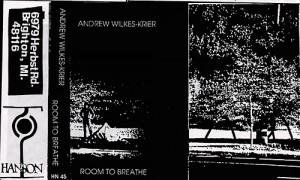
Andrew W.K.: Yea, I have spoken to Knox Mitchell about re-releasing several of the earlier Andrew W.K. items, which includes You Are What You Eat. I believe he has that and whatever is on the other side [side B]. I think he has a couple of those rare early tapes he found somehow. There’s also that album by AAB called “Bright Dole”. It’s not “Andrew W.K.” or “Andrew Wilkes-Krier” it’s another thing from those earlier days and he recently wrote to me about re-releasing that; I said “yea”. Actually, Fred Thomas who originally released that still has the master. So we’ve been talking about that and it got held up a little bit but it’s definitely a possibility.
During that time I was living on my own for the very first time. I had moved out of my parents house in Ann Arbour and moved to Ypsilanti where I was living in an apartment. I believe I’ve told you about that before, where we recorded Artist Against Apartheid. It was when I really, really got into recording in earnest. I was finding out how to record better and in higher quality, or at least learning more about the techniques. I was also going into recording studios with bands I was playing with or on my own, which I had never really done before. So it was a really productive time and also a very exciting time just to be independent and live in my own house.
One night I recorded You Are What You Eat, I was in the mindset that I wanted to put out a lot of stuff because I was recording a lot of stuff. I liked the idea at that point of being prolific. I’m not exactly sure what I was thinking, but there was definitely some kind of creative surge to want to put out a bunch of stuff. Unfortunately I didn’t end up putting out a lot of it because either they were sort of harebrained ideas or they were just ideas on there way to growing into something better. But a few things I did actually finish, Aaron Dilloway was kind enough to release on cassette, about ten copies or something. One of those was You Are What You Eat. That music, I just had this idea in mind for this sound, this distinct feeling of what this kind of music would sound like. It was supposed to kinda sound like a fever [SIC], just sort of discombobulating and disorienting. You don’t really know what part of the song you’re in exactly, or what is being said, or what’s going to happen next. It was the kind of music I would imagine if you were on another planet and who had never heard music before. Maybe what they would think of music in general, it’s hard to explain. It was high-context in that way. The way it ended up sounding… have you heard it?
AWKMusic: No I haven’t.
Andrew W.K.: You should ask Knox, you have my permission to put it out if he cares to share it. I know I have a copy of it somewhere around here as well, everything needs to be organized [talking to himself], it’s not that bad. I have so much stuff, it’s just not organized. But the music was [starts singing] “You Are As You Go! Go! [makes sound effect]“. There would be crashing and then sort of some rhythm and then “You Are As You Gooooo!”. It was as disorienting as I could make it, that is the best way to describe it. It was also quite short, I think there was maybe two or three songs on the tape. So each side of the tape was probably ten or fifteen minutes long.
AWKMusic: Wow, it sounds amazing!
Andrew W.K.: Well, I don’t know if it was really amazing but it’s amazing to me that it happened at all and that it’s still around in some form at all.
AWKMusic: So it’s not “Party Rock”, it’s more of an extension of your “Noise” roots.
Andrew W.K.: Well it sounded like a band playing but it wasn’t really harsh like [makes static noise], or anything like that. All those things at that time, I had spent so much time playing piano and regular music, I was just interested in anything that didn’t sound like sitting down at a piano. So yea that was definitely an extension of that same motivation. Just trying to avoid hearing the same things I had already heard at that point. I wanted to make something new or hear something that sounded new.
AWKMusic: You did a jingle for a Kit Kat commercial. Also there are some BMI tracks listed under your name. So my question is, are there other “jingles” that you’ve done?
Andrew W.K.: No, that one came out specifically for that. We did have other songs used in ads from the versions on my albums. However, the first ad we ever did was an Expedia ad. They used a really early version of “It’s Time To Party” that came out on “We Want Fun” — the supposed album. They used that version instead of the version that came out on I Get Wet because I Get Wet wasn’t even done or had come out yet.
Other than that, we had a lot of other commercials and movies that just used the regular I Get Wet or The Wolf recordings. But Kit Kat, they had been looking and wanting to use Party Hard. But one of the creative directors at the advertising company really liked the idea of making a new song. So he asked me rather than just using Party Hard, if I would be willing to write a new song just for the ad that he could have input into; but was still the same style. That to me was really, really exciting because I loved Kit Kats for a long time, I think it’s my mom’s favorite candy bar. So it was kind of a personal connection because I was already a fan. Also just getting to write music for a candy commercial in general was really exciting. These are things that I have always dreamed of being able to do. I did “Andrew W.K.” so I could get to make a Kit Kat ad. It was just one of the great things that happened as a life experience. Not to mention making money from it, I would have done that for free! That’s what it’s all about to me and the ads turned out so great. They are really high production, they are really beautifully shot, they’re the really classic Kit-Kat vibe, but really funny. Then Dee Snyder, I don’t know if most people know this, is the voice-over guy who does the announcement like [changes voice] “break into a chewy, crunchy, crisp-ity, Kit-Kat bar” – that’s Dee Snyder! When he did that, I just thought “well, that just confirms that dreams really do come true”. I got to meet him several times and I mentioned that to him.
EDITORS NOTE: There are at least two other versions of this video, if you have a copy of it please upload it here. Find the high quality MP3 version of the song here. Andrew once played this song live at the Zepp Tokyo concert.
I’ve produced music that’s been used commercially for various things where they requested certain mixes or certain kinds of songs for certain things. The only other jingle similar to that, I did some stuff for VH1. I did a show, an episode where they approached me about doing the music and again it was such a fun thing. I learn so much from these projects, that’s why I do them. It makes better at recording, it makes me better at figuring out music and they’re just really fun. These are the things I dreamed of doing before I ever really got into the music business. I was just always fascinated by commercial music and so I did the music for a TV special episode called “40 Hottest Hotties of the 90′s” on VH1. It required like 45 different pieces of music, or 45 recordings, or 45 short songs ranging from five seconds to fifteen seconds. There’s the main theme [sings] “40 Hottest Hotties of the 90′s”. Then there was a song recorded for every single person they talk about, I think they used it. That was a huge amount of work, but again the most valuable kind of experience. At least for me in terms of recording it takes me to the highest level and I guess through all those sound effects like the wipes and sparkles and bings and just every kind of thing when you watch TV. Because it’s just non-stop sound effects [makes a bunch of sound effects].
EDITORS NOTE: What the… ? Has anybody even heard about this before?! You can definitely hear Andrew’s influence and even vocals throughout the entire show. Checkout parts 1, 2, 3, 4, 5, and 6 of the show. In another post I’ll have to cut all of these together.
That’s what’s so great about Destroy Build Destroy too, the sound effects and the sound design. Like when the screen wipes from one shot to another shot it goes like [more sound effects]. It’s just like the radio [changes voice] “You tuned into [FX] 99-5 [FX]” and all that stuff. Obviously I’ve included as much as possible into my music but it’s not as upfront as it is on TV or in movies. That’s why I love commercial recordings so much, I’ve always been really into sound FX and sound design and the way ad sounds. I mean, how did they get that thing to sound like that? Those things have to sound as exciting or particular as possible, you’re using sound in those situations to make an impression on people that goes beyond entertainment. You’re trying to make them feel a certain way to accomplish a certain goal or sell them a certain product or make them feel a certain way about a certain person or place or whatever. I’ve always loved the way that sound can be that powerful and you can manipulate it and manipulate the listener with how you present it. It can be done in pop music or recorded music of any kind.
That’s why I like TV so much, it fuses these creative tools and art with commercialism. It’s just really appealing to me, it’s kind of like a carnival. A carnival is a better example then an amusement park because it’s trying to lure you in through excitement and sound and also by the way things look and how things sparkle and the lights and the paintings. Just like at a haunted house or fun house at a carnival, there’s all these crazy paintings on the front of it and all this stuff and it looks really huge and maybe it even goes three stories up and when you go inside you realize, oh that was all to lure me in. It’s not even that big in here, there’s not much stuff, some of the displays in the haunted house aren’t even that scary but that’s the whole thing, that’s the trick. So I love that old dialogue that happens. It’s entertainment but it’s entertainment where you’re trying to snare the person and excite them, maybe in a way they don’t even realize you’re doing. It’s sort of that “step right up, step right up” approach to presentation. You can go and see all kinds of different shows or entertainment but there is this certain brand of entertainment that’s reaching out to you like that. That’s the stuff I’m usually attracted to, the stuff that’s really aggressive I guess. Meaning, it’s not some dude singing by himself playing guitar in his bedroom (although there’s nothing wrong with that, I’ve done that plenty of times myself). But my music or entertainment is not made for that audience, it’s not made by the person who’s making it just for their own sake or for their own fun of it, it’s made to try to get into someone’s head. It’s trying to get to that person in a very aggressive way and get their attention and to jar them or make some kind of impact.
AWKMusic: Right! Well I don’t know how you do it but you’re a master at manipulating excitement through music. A lot of your releases are different sounding yet each one somehow has this same vibe of excitement whether it’s Party Til You Puke’s dance beat/techno-y sound or the Wolf’s triumphant sound.
Andrew W.K.: Thank you, they all have different motives which are intentional. I guess I’m always trying to make them sound the best way I can. I have different ideas of what that is or how I get there. It also doesn’t seem entirely necessary re-create the exact sound. That’s what I’ve always liked when I’ve liked an artist, it’s like “ok what’s this album going to sound like?”. That was always one of the most exciting parts of discovering some group or band or musician or whatever. It was “wow ok I just found out about this person and they have four albums out already, I’m going to get all of them”. Then it’s “wow what’s this one going to be like and what happened at this point and what’s the artwork in this one?”. I liked it when there was always consistency but there also was this thing where it was as if they were in a different room or they used a different amp or something. You can tell it’s the same person it’s that same sound, just slightly shifted in some way which gives it color.
AWKMusic: I read a long, long time ago about “The Mechanical Eyes” can you give me some background behind that?
Andrew W.K.: That was the first recording I ever did with the intent of playing it for other people and had copies of it at the time to sell. That was in 6th grade… I’m trying to think if that was before or after I had a four-track or after. That had to have been way before… so I just had a boom box but I noticed it did have stereo recording which was pretty remarkable. I remember when I figured out that when I spoke into one side of the speaker where the mic was the sound would be in that ear and then if I spoke into the other side of the speaker where the other mic was then the sound goes to that ear. I just couldn’t believe that because I heard that on certain recordings and thought it was the most insane and amazing thing to have a voice behind me or in front of me or in the middle and now it’s over here. It was a very early process learning about stereo sound. I had a keyboard that had a broken drum machine which had a lot of good sounds. I used it for years and years including when I moved to New York and first started doing Andrew W.K. that’s the same keyboard I had since I was 11 or 12 years old and used it all the way through.
I don’t remember how many songs are on there, I would do anything to have a copy of it, that is one that I do not have. It’s hopeful that there is some copy that’s in Michigan at my parents house or a few old school-friends from that era. I’ve heard through the grapevine, they many still have a copy of it. So hopefully one will turn up but I don’t remember much about how that stuff sounded. That song “Mr. Surprise” would be very similar to that, it’s from that same era. I believe it was recorded the same way. That song might even be from that tape of Mechanical Eyes. I made a cardboard sleeve of some type that may have even folded out a little bit from the cassette box. My mom took me to Kinko’s when they had the first versions of color copiers, they were terrible. It was unbelievable how bad these color copiers were back then. But I was always extremely excited just about getting color copies made at all. But it looked so bad [laughs], I wonder if it was even worth getting colored copies?! It was very bizarre to even bother offering people their service of color copying and have it look that way, but you have to start somewhere. They were all messed up looking. Anyway, we made about ten copies and I tried to sell them at school. I probably just gave most of them away to my friends but I know some people bought them and I think they liked them. Yea, you know what actually, nobody said anything bad about it which was pretty amazing. I never really thought about that. People were just very encouraging. All the kids in my school, many of which I wasn’t particularly friends with or anything. I had friends at that point for sure but I wasn’t like a popular kid so much. Thinking back on that, it was definitely really nice. I do appreciate that so much that the kids were very encouraging and very positive and saying “oh yea this is awesome, it sounds so good”. You know, it was similar to being a really good athlete in your class or maybe being really good at drawing or maybe really good at doing magic tricks or something. There were kids who would have those skills, but I was the kind of kid who was showing that he was making these recordings. There was a lot of kids who played instruments and played piano very well, there was actually another couple kids who played specifically at my school that were very, very good piano players that were as good or better than me. But it was more that they were encouraging me to be the recording guy. Which was nice!
AWKMusic: Yea I’m sure when you’re that young and you’re putting out recordings, you’re kinda like “the cool kid”.
Andrew W.K.: Yea it was a very small school and they were supportive of me doing anything, which was nice. It was a great, great school and had a huge impact on me. It was called “Green Hills”.
AWKMusic: So I’m a fan of classical music and sometimes I feel like I can sense the classical influence even if it’s not piano, how do you put that into this “Party” music?
Andrew W.K.: Genre names are useful when you’re trying to easily describe something to someone. So if I hear the word classical I think it’s going to be an orchestra with maybe violins and french horns and things like that. Just like if I hear the word Jazz I’m going to think about saxophones and a lot of ride cymbal and an upright bass. But after a certain point I also find those kinds of head-spaces to be a bit distracting and also unnecessary when ultimately at the end of the day we just want to focus on the music, just the music. At least for me, I don’t want to focus on what it means or what it’s about or what they’re trying to say or who made it really; that’s all just icing on the cake. But when it gets down to it I also want to be able to appreciate any instruments that could be playing this [his] music, meaning you could have jazz instruments playing rock songs you could have rock instruments playing classical songs, you could have classical musicians playing pop songs, you know whatever! It should still hold up.
That comes down to rhythm and melody so I just really like melody and if you listen to classical music there’s incredible melody. This music could be rock songs, or jazz songs, or techno songs, or any other style of music. Techno is a great genre to do classical instrumentation because it’s so dramatic, it’s so clear and hard hitting. It’s a lot of huge sounds that sounds like an orchestra with massive keyboards that sounds like string sections. So I just really like melody and the intensity of the feeling that comes from melodies and the certain way you feel without needing lyrics, without needing to know what the song is about or anything. It’s not even about an idea, at least for me. It doesn’t make me think about “oh this is a happy feeling or this is sadness” it’s just feeling. I mean, it feels good so I guess it’s happy in that way but it’s just raw feelings and sensation and that’s all I take away from anything, classical music or otherwise. It’s just like “ok here’s a moment in a song, it could be a classical song, it could be whatever. This makes me feel really good here, what’s going on here? What is it about this melody that does it? Oh I see, it’s these notes, at these intervals with this kind of timing, with this and this approach.” It’s about trying to learn all of it and knowing what it does. Like knowing that this creates thatexciting feeling as well and then I just incorporate all of that into my music. I don’t really want it to be and I don’t really think it sounds like classical music, I hope it doesn’t. I mean even though I use a lot of orchestra sounds I just want it to sound and have that feeling. I use to not like to call it “rap” music or anything at all because what I wanted was for people to not be distracted by anything and just be able to feel that physical sensation, that energy. But now I don’t care because “rock music” is an easy way to describe its instrumentation that people understand. With guitar and loud drums and loud singing and everything is really intense and once they understand that, than I just hope they able to focus again on that sensation.
AWKMusic: Oh ok, so it sounds like you’re more focused on the melody and maybe that is what I was thinking in terms of.
Andrew W.K.: Yea! There’s no approach of “OK how can I make this sound like a classical song?”. I don’t even really consider myself classically trained, I was just very traditionally trained and one could have learned what I learned on any instrument. It was just a very basic understandings of music. It was just like if you have very traditional training on how to draw the human body and then you go on to do an abstract sculpture or something, but still that training allows you to incorporate aspects of that. It helps you get to the feeling you’re trying to get to by whatever means necessary. That just happens to be one of the things that I’ve learned and can draw from, traditional music playing. But there’s a lot of things that they didn’t teach us, like all kinds of things about sound, about performance and about energy. They really just taught us about melody. Even though it might not sound like there is a lot of melody in some of my music to some listeners, that’s good too because they might be distracted by it. But it’s all in there, they don’t even need to hear it, I try to blend it all together so it’s not real clear what’s going on.
AWKMusic: Thanks again Andrew I appreciate it. I’m looking forward to next time.
Andrew W.K.: Excellent, thank you… always!
End of Part 3
Stay tuned for part 4 of 4 – coming soon!

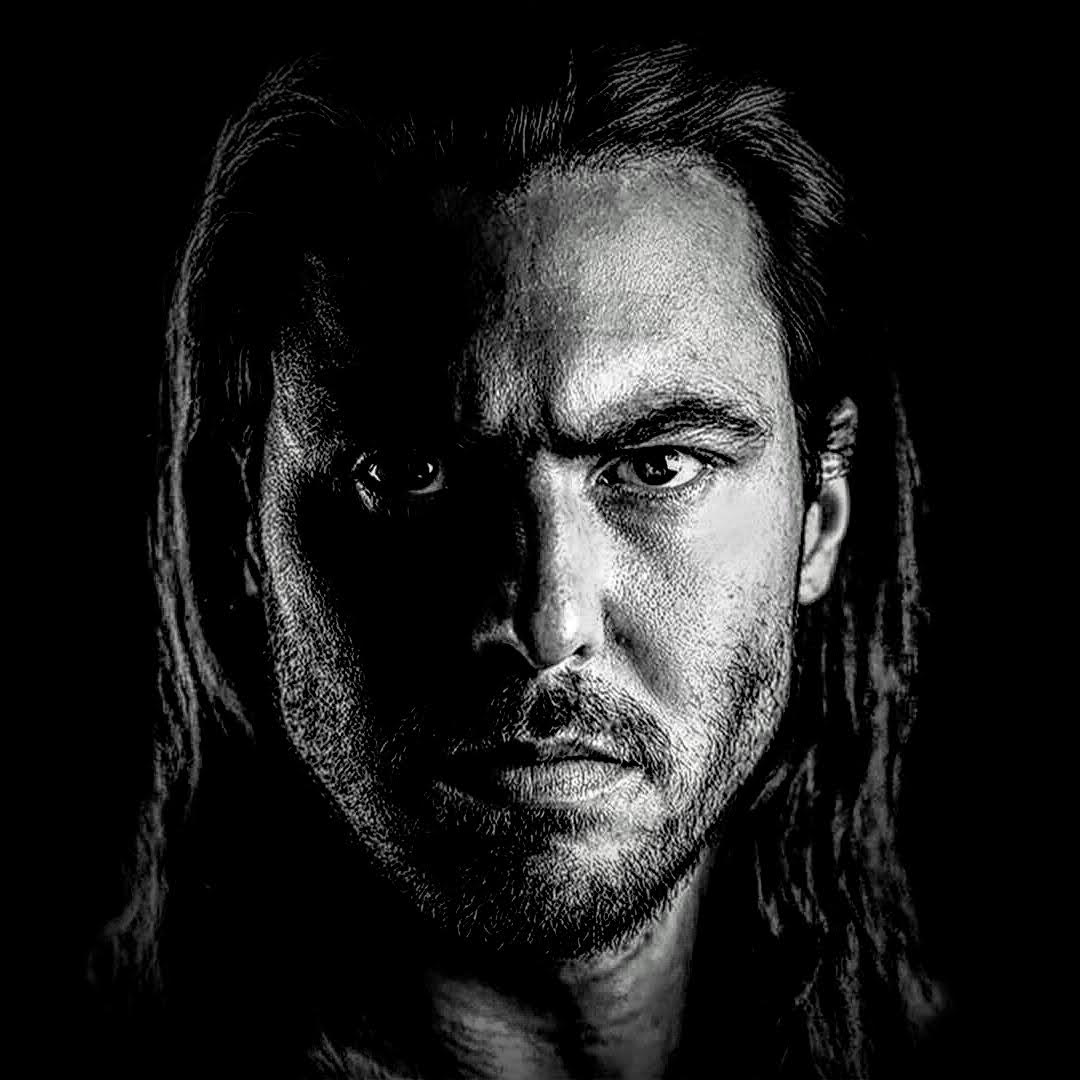

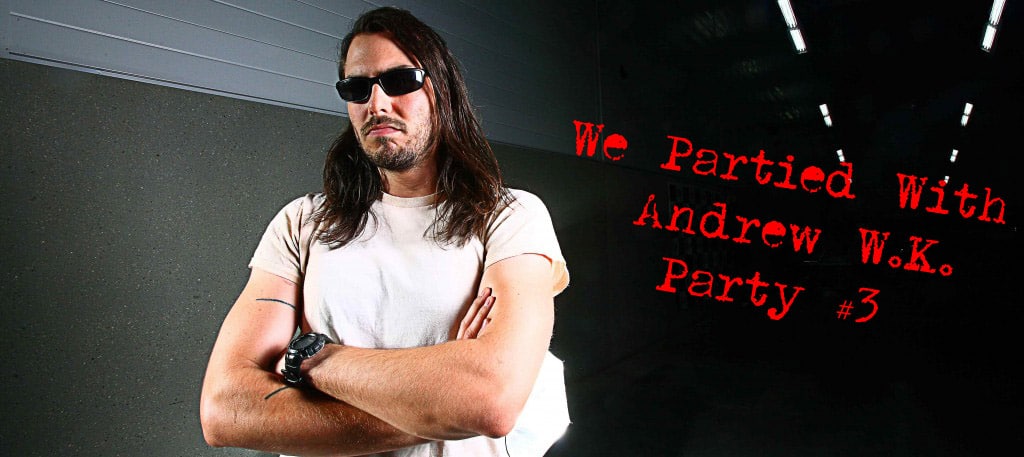
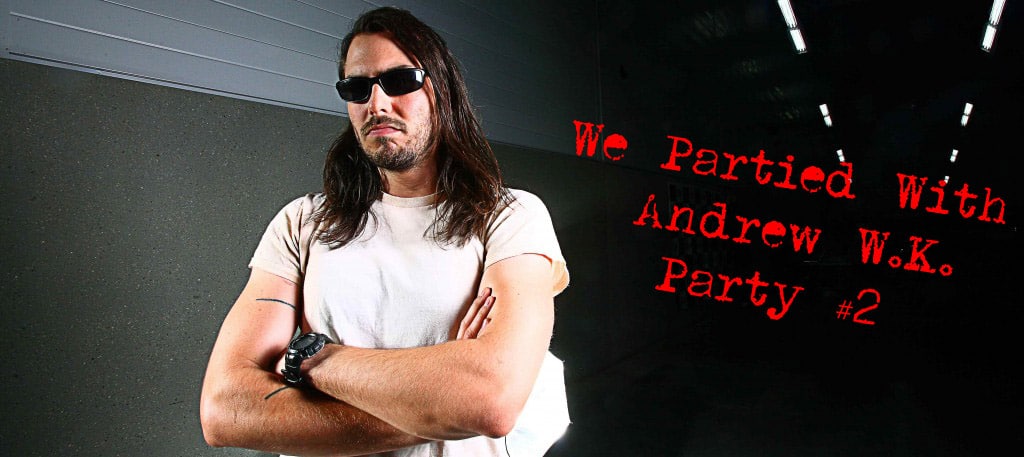
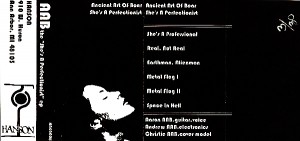
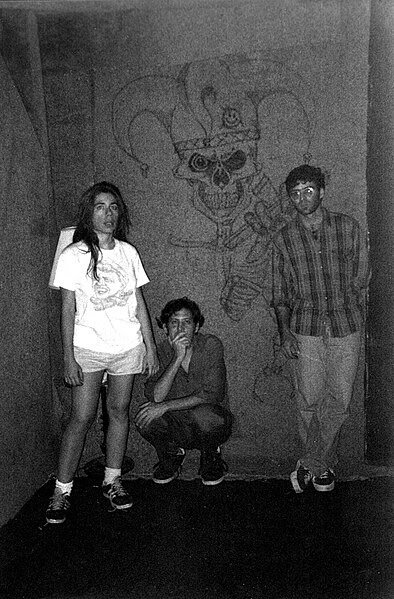 Andrew W.K.: That was recorded in 1997 or so in my apartment. The first time I lived on my own was when I moved to Ypsilanti, Michigan. Which is about 10 or 15 minutes from Ann Arbor, they’re right next to each other. But it’s a very different vibe and it’s an amazing town. Most of my friends throughout these years we are talking about lived in Ypsilanti. They had already graduated high school and some of them were going to college at Eastern Michigan University which is in Ypsilanti. It’s a much smaller city and very, very, very strange and I just loved it. We all loved it, I still love it. I would still in some ways rather live there than Ann Arbor, just because it has such a strange tone to it. So it’s one of my favorite towns and I just can’t get over it, it’s a very bizarre place. There is a band called “
Andrew W.K.: That was recorded in 1997 or so in my apartment. The first time I lived on my own was when I moved to Ypsilanti, Michigan. Which is about 10 or 15 minutes from Ann Arbor, they’re right next to each other. But it’s a very different vibe and it’s an amazing town. Most of my friends throughout these years we are talking about lived in Ypsilanti. They had already graduated high school and some of them were going to college at Eastern Michigan University which is in Ypsilanti. It’s a much smaller city and very, very, very strange and I just loved it. We all loved it, I still love it. I would still in some ways rather live there than Ann Arbor, just because it has such a strange tone to it. So it’s one of my favorite towns and I just can’t get over it, it’s a very bizarre place. There is a band called “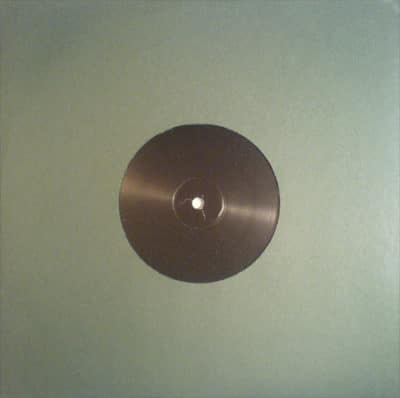 There’s one recording that I worked on really hard with Aaron. It was during that brief time when Aaron and Nate Young moved to New York and we all lived in my apartment. So that was in ’97 or ’98 or whenever I had first moved out. It was probably right around the time of the second year or at least year and a half of moving there. For those months they lived here, we did so much work, we did tons and tons of stuff. We recorded that Wolf Eyes 12″ that I did with them for that split on Bulb. I also recorded a Beast People song which I believe was released as a 10″, yea I think it came out on vinyl as a 10″. It’s probably on the
There’s one recording that I worked on really hard with Aaron. It was during that brief time when Aaron and Nate Young moved to New York and we all lived in my apartment. So that was in ’97 or ’98 or whenever I had first moved out. It was probably right around the time of the second year or at least year and a half of moving there. For those months they lived here, we did so much work, we did tons and tons of stuff. We recorded that Wolf Eyes 12″ that I did with them for that split on Bulb. I also recorded a Beast People song which I believe was released as a 10″, yea I think it came out on vinyl as a 10″. It’s probably on the 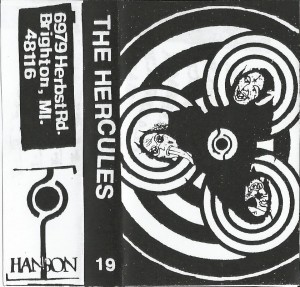 Andrew W.K.: I was never in Galen, that was Aaron Dilloway’s band. It was probably his first really successful band. I mean, he had done a lot of bands before and projects that he had released. However, Galen was a real big step in terms of everything; quality, how often they played shows, they were a real performing band and made releases that looked really good. I was just so impressed by how good everything looked that they did. Not to mention the music, which was just incredible. Just the artwork and the packaging and the design, I was very impressed. I was like “who the hell is this guy? who are these people?”. Because it’s a smaller town and just when you see someone who can make a good flyer, it really catches your eye because most of the flyers look like shit. He lived in Brighton, Michigan which is quite a ways away. It’s still southeast Michigan, it’s like an hour or 45 minute drive, in an even smaller town than Ann Arbor. So it was so amazing that I didn’t already know this guy and that I hadn’t met him, it was all really exciting. Then he ended up moving to Ann Arbor and that’s when it all unfolded over the course of a couple days. I got to finally meet him and then go over to his house and become friends and then the next thing I realized, I was playing in bands with him. It was like meeting my idol, it was really exciting. So Galen had a huge impact on me and that was all Aaron Dilloway–of course other people were in the band. Also, there were other versions of the band, I played in a version called “Galen Via Hercules” and than that turned into a band called “
Andrew W.K.: I was never in Galen, that was Aaron Dilloway’s band. It was probably his first really successful band. I mean, he had done a lot of bands before and projects that he had released. However, Galen was a real big step in terms of everything; quality, how often they played shows, they were a real performing band and made releases that looked really good. I was just so impressed by how good everything looked that they did. Not to mention the music, which was just incredible. Just the artwork and the packaging and the design, I was very impressed. I was like “who the hell is this guy? who are these people?”. Because it’s a smaller town and just when you see someone who can make a good flyer, it really catches your eye because most of the flyers look like shit. He lived in Brighton, Michigan which is quite a ways away. It’s still southeast Michigan, it’s like an hour or 45 minute drive, in an even smaller town than Ann Arbor. So it was so amazing that I didn’t already know this guy and that I hadn’t met him, it was all really exciting. Then he ended up moving to Ann Arbor and that’s when it all unfolded over the course of a couple days. I got to finally meet him and then go over to his house and become friends and then the next thing I realized, I was playing in bands with him. It was like meeting my idol, it was really exciting. So Galen had a huge impact on me and that was all Aaron Dilloway–of course other people were in the band. Also, there were other versions of the band, I played in a version called “Galen Via Hercules” and than that turned into a band called “